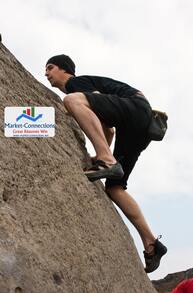Grit MeaningIf you choose Perseverance, Self-Discipline, and Passion as three different traits and combine them together, you have just built a new characteristic and it's called GRIT. Many teachers, psychologists, and other professionals now believe that having grit is more important than having a high IQ score, fine genes, or the highest grades. And thus, grit continues to build momentum. What is GritPut in basic terms, grit is perseverance and passion for meaningful, long-term goals. It’s the capacity to continue to persist at something you’re passionate about and to persevere even if obstacles get in your way. This is the type of passion that’s about commitment and direction, not infatuation or intense emotion. With this type of passion, you’re able to remain committed to tasks that are boring, difficult or challenging. Not only that, but grit is about perseverance and self-discipline too. To define perseverance, I'd say it means sticking with it and continuing to work hard, even if you experience failure or difficulties. Grit is incredibly important in life because it drives our success and achievement. Being naturally talented and smart is great, however, if you want to truly thrive and do well in life (and who doesn’t?) you need to be able to persevere. Without grit and resilience, talent can amount to nothing but unmet potential. It’s only when you put in effort that your talents become skills that can lead to success. What Is ResilienceLet’s look more closely at resilience. To define resilience, I'd say it is being able to recover from even the most difficult of life’s events. It is your ability to cope with adversity, withstand it and, when you fail, to bounce back and carry on growing, even when life takes a downturn. Resilience isn’t a trampoline. You won’t be up one moment and down the next. Rather, it’s more like a mountain climb with no trail map. It will take strength, time and support from others. You’re sure to experience many setbacks on the way. Eventually, though, you’ll get to the summit and be able to look back and see the distance that you’ve traveled. It’s important to note, though, that resilient people will still experience emotional upheaval, suffering, and stress. While it’s common to equate being resilient with being mentally tough, instead, demonstrating resilience means working through that suffering and emotional pain and coming out the other side stronger and more positive. Resilience is vital since it gives you the strength you need to process hardship and overcome it. If you lack resilience, you’ll be overwhelmed too easily, and can be tempted to adopt unhealthy coping strategies to get through the tough times. Resilient people, on the other hand, can tap into their own support systems and strengths when it comes to overcoming challenges and working through problems. Resilience comes in two forms. Emotional resilience allows you to tap into your own optimism, even if you’re trying to cope in a crisis. Meanwhile, physical resilience is your body’s capacity to adapt to a challenge and to recover more quickly. Both are helpful when it comes to overcoming adversity. The good news is that resilience isn’t a trait that’s fixed in place. You can bolster or even build resilience in yourself by changing your behaviors and patterns of thinking, helping you to find more inner strength. Grit and Resilience In The WorkplaceOne obvious situation in which grit and resilience are vital to success is in the workplace. Most of us have wondered from time to time why this or that person is so successful in their work. It’s important to understand that their success doesn’t come from their intelligence, their talents, or even their willingness to work for extra time or take on more commitments than are strictly necessary.
In the modern workplace where rivalry, strict deadlines, staff cutbacks and organization change are all commonplace, this type of success relies solely on the individual’s ability to not just cope, but to know how to stay motivated after a setback. When you encounter the inevitable challenges, you’ll encounter in the workplace, you need to be resilient and bounce back. The workplace will always present several stressors to its employees. So, how can you become more resilient at work? It’s important to be aware that resilience is actually just a skill, and like other skills, it can be learned and improved with practice. A resilient employee can build strong relationships and connections with others. These are high-quality relationships that are characterized by several features, especially effective communication. Resilient workers who have positive working relationships do everything possible to help others to become successful at work since they’re team-players aiming for a win-win situation with all their fellow employees. A resilient employee will also nurture the working network they’ve forged, building trust consistently with other people and fostering positive emotions with other employees. The modern workplace is typified by stress, and with internet access and cutting-edge technology, work is constantly present in our lives. A resilient worker can manage this stress effectively, preventing it from becoming detrimental and overwhelming. By engaging actively in self-care, nurturing themselves when they experience stressful times, a resilient employee can avoid burnout. A further characteristic of resilient employees is that they are true to their real selves. They behave in ways that align with their personal beliefs and values. Essentially, they demonstrate grit in their determination to achieve their challenging and ambitious goals, whatever obstacles they encounter. A gritty, resilient worker perceives their work as meaningful and, thanks to this mindset, they feel their work will achieve an outcome that is valuable. This equips them more effectively to cope when work is stressful. Even with a resilient mindset, employees will experience stress at work. But, a key characteristic of such workers is that they monitor their thought patterns when under duress and identify the patterns that impede their chance of success. Resilient workers are also adaptive and flexible, ready to cope with change in the workplace. So, how can you develop more resilience and grit in your working life? Take a positive stance – this allows you to adapt more effectively to adversity, giving you more control over your working environment. Putting motivation and energy into your work will build personal resilience. Having emotional insight – with emotional insight, you can be more aware of the emotions you’re experiencing, and whether they’re positive or negative. You’ll also be able to consider the impact of your behavior and reactions on yourself and others. Developing balance – personal resilience is achieved through a healthy work/life balance. You need to take the time to recuperate, unwind and relax so you can bounce back from stress. Fostering spirituality – finding purpose and meaning in your work and believing it contributes to a greater good buffer the negative effects of stress. Becoming reflective – if you can be in tune with your emotional reactions and feelings, this helps to protect you from the negative effect of stress. An awareness of your potential triggers will allow you to prepare effectively and gather the necessary resources so you can bounce back in the face of adversity. |
Categories
All
powered by Surfing Waves
AuthorMandy Fard is a Certified Professional Resume Writer (CPRW, CMRW) and Recruiter with decades of experience in assisting job seekers, working directly with employers in multiple industries, and writing proven-effective resumes. Archives
July 2024
|
-
Greater Los Angeles
and Kern County
-
[email protected]
.






 RSS Feed
RSS Feed



